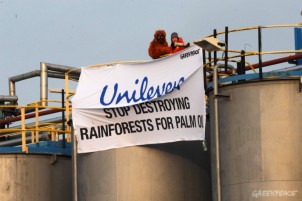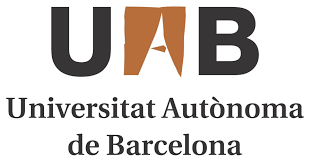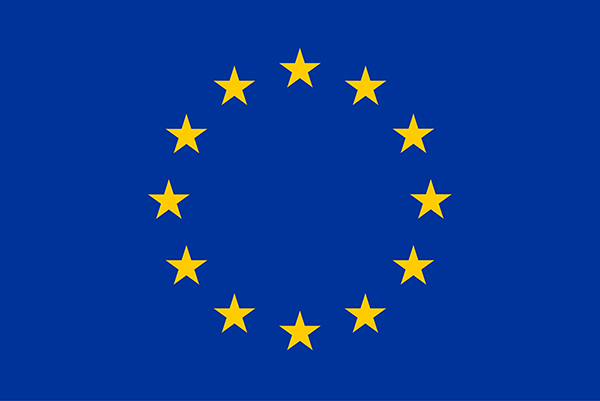
By Peter Gerhardt.
Baby food scandals in Africa, tropical forest destruction for candy bars: There are companies like Nestle that attract scandals like light the flies. On the other hand there are the Teflon-corporations, such as the American Newsweek magazine once called multinational corporations who do basically exactly the same as their competitors, but on which critical allegations do not stick. Unilever is the prototype for this. Unilever is even praised by major international environmental organizations like WWF for its environmental commitment. How can that be, although Unilever is one of the largest palm oil consumers in the world?
First of all, Unilever has contracts with scandal firms like the palm oil multi-national Wilmar. Wilmar has a record of continuing human rights violations and illegal logging and is the world’s largest palm oil trader. With the help of police units, Wilmar destroyed the village of Sungai Beruang as well as neighbouring settlements which were located within the palm oil plantation, in order to break the inhabitants’ resistance to the palm industry1. Friends of the Earth have documented serious human rights violations of Wilmar in Uganda2. Unilever is one of Wilmar’s largest customers and is jointly responsible for the crimes and violations of its supplier.
At the same time the palm oil boom has been a disaster for the world’s climate. The conversion of rainforest into oil palm plantations has made Indonesia the third largest emitter of the greenhouse gas carbon dioxide. This does not prevent Unilever CEO Paul Polmann to celebrate himself as protector of the earth’s atmosphere at the climate summit in Copenhagen in 2009.
Besides this, Unilever is engaged against agro-energy but this doesn’t follow altruistic motives. Instead of the threat for the world’s food supply it’s the cheap access to raw materials that worries consumer food companies such as Unilever.
Unilever’s greenwash communication primarily relies on the RSPO (Roundtable of Sustainable Palm Oil) certification scheme. Unilever admits that the global palm oil production causes serious problems, but also points out that these can be solved with the help of the RSPO. From the perspective of Robin Wood and its partners in Indonesia, the RSPO is merely a helpful tool for Unilever to greenwash its businesses as usual. The following five points explain why:
RSPO membership is industry dominated
581 companies face only 26 NGOs and 11 of the 16 seats at the RSPO board are reserved for banks and palm oil business. The RSPO is chaired by Unilever and not by a neutral party. This means that Unilever has significant control over this certification scheme.
Weak criteria
Because of these structures, the criteria are weak. Palm oil companies that have massive conflicts with local people receive the RSPO label. In addition, RSPO allows forests to be converted for new plantations and tolerates the use of extremely toxic agrochemicals such as Paraquat. No wonder, as the manufacturer of Paraquat (Syngenta) is itself a member of the RSPO.
Dependent certification bodies
The companies that apply for a RSPO certification pay the certification bodies. This direct commercial relationship leads to a race to the bottom: The certification body that overlooks as many errors in favour of its client, receives more lucrative contracts. An example of this is provided by the RSPO accredited certification body TÜV. ROBIN WOOD has reviewed the actions of this certifier in October 2011 in a case study in Sumatra and alarming deficiencies were found3. Key players at RSPO were informed about the failures of TÜV in Indonesia, but so far without any consequences.
From right-holder to stake-holder
The RSPO turns in his practice local people with land rights (right holder) into people with legitimate interests (stake holder). At the roundtable local people are forced to negotiate with representatives of the mighty palm oil lobby on their rights. This implies, that a fair compromise could be found somewhere in the middle between aggressor and victim. In this scenario local people can only lose. Human rights are not negotiable.
The over-exploitation continues – RSPO promotes the expansion
The most important contribution of a sustainability label for palm oil would be to stop further expansion of the palm oil industry. This is a clear demand of Indonesian environmental and human rights organizations like Cappa, Walhi, Save Our Borneo or Perkumpulan Hijau together with Robin Wood. On the opposite, companies that are members of the RSPO are among the drivers of the expansion for new plantations. Current examples can be found in the Indonesian province of West Papua. RSPO members like Wilmar, Medco or Rajawali started a giant palm oil project at the expense of the local population and the last remaining rainforest4.
Conclusion: NGOs and the broader public should not be blinded by Unilever’s Greenwash strategy. Corporations such as Unilver by making contracts with the global palm oil business are co-responsible for the displacement of people, clear-cut of forests and contamination with toxic pesticides using the RSPO to greenwash these practices.
More info: peter.gerhardt (at) ovi.com
1[Robin Wood press release at http://www.robinwood.de/Newsdetails.13+M55ead9b1d73.0.html]
3[Statement Robin Wood zum TÜV Rheinland at http://www.robinwood.de/uploads/media/Statement_Robin_Wood]





Pingback: Unilever se maquilla de verde con la RSPO | WRM Español
Pingback: Unilever’s greenwash with RSPO | WRM English
Pingback: Quand Nutella veut montrer patte blanche, Ferrero n’en dit pas assez